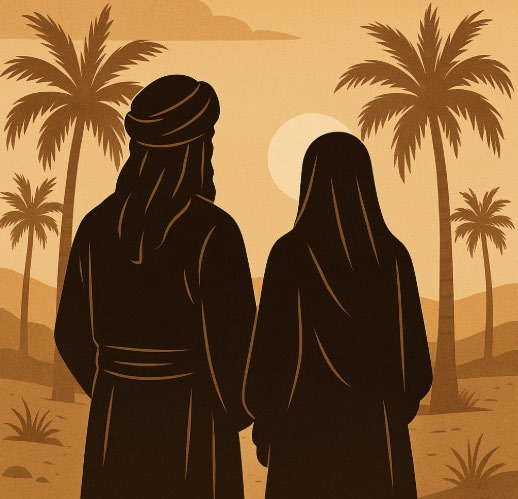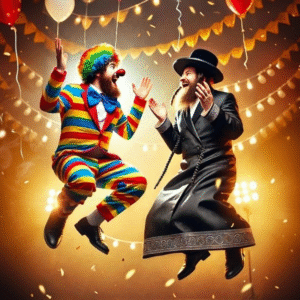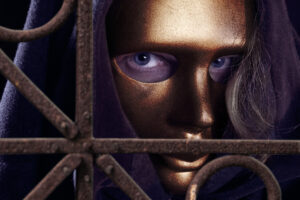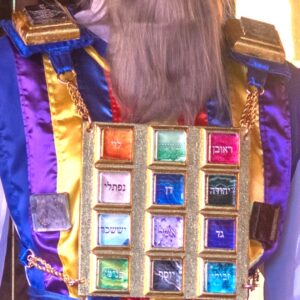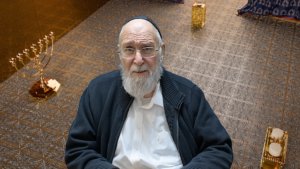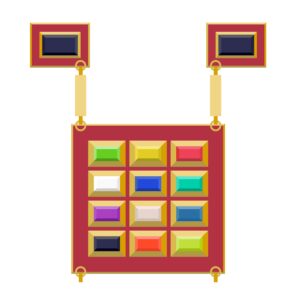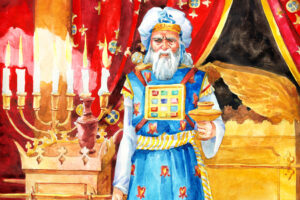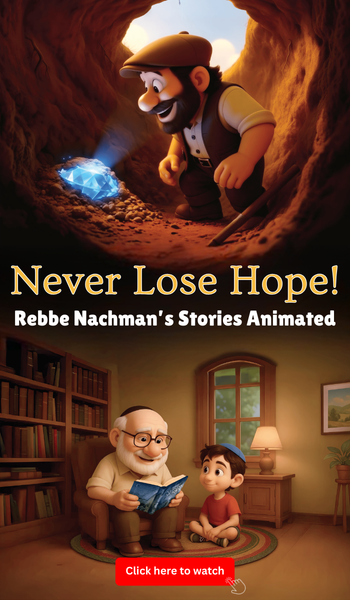Faith is the Foundation
FROM THE UPCOMING ‘REBBE NACHMAN’S SOUL’, ADAPTED FROM HIS AUDIO SHIUR ON SICHOS HARAN 34
THE EMUNAH OF YITZCHAK AND RIVKAH
Yitzchak and Rivkah had been married for many years without a child. They were the two greatest people in the world – Yitzchak, the greatest tzaddik, Rivkah, the greatest tzaddeikes. They possessed the greatest power of all: the power of tefillah. In gematria the combination of the names Yitzchak (208 = יצחק) and Rivkah (307 = רבקה) equals tefillah (515 = תפילה). As the pasuk says, “Vayetar Yitzchak leHaShem lenokhach ishto” (Bereishis 25:21), Yitzchak prayed to HaShem opposite his wife. Together, they both davened so hard with such intensity. Imagine their kavanah. Imagine the power of their combined tefillah to HaShem to have children. Not a day or a month but a whole year went by, and there was no sign of her becoming pregnant. They didn’t give up hope, though. They continued on and went through the second year with the same kavanah. They went through it with the same desire, the same hope, the same worry and fervor in their hearts. The second year went by, the third, the fifth… until ten years went by. The Gemara says that after ten years of childlessness, by nature a woman becomes completely infertile (Yevamos 64b). Yet, even after ten years without a child, there was no lessening of tefillos on the part of Yitzchak and Rivkah.
A person usually becomes despondent after going through just one year of marriage without a child. Rivkah and Yitzchak didn’t have children for many more years. What kept them going? What kept them running at such a pace, with such a power of tefillah? They suffered so much; their hopes dashed each time they thought that this would be it. For ten years they kept on going and then faced another year. After eleven years, you would figure that they would be in a state of yiush, giving up hope. Yet they went on and on, until twenty years passed. That’s two decades without yiush, without giving up hope, and constantly being guided and propelled by one thing: their staunch faith. Ultimately, regardless of how short or how long it takes, such faith must result in children.
FAITH IS CHILDREN
Rabbeinu zal says that emunah (102 = אמונה) is numerically equivalent to banim (102 = בנים). Faith is equal to children. If faith remains solid in the face of a test, the test is rewarded. When faith remains solid, the result will be that they will ultimately have children. We see this for a fact. All the cases of these nashim tzidkaniyos, every one of them, ultimately resulted in childbirth. This, of course, is a lesson for many people nowadays, too.
THE REBBE’S GRANDSON
We can’t say that those days were different from today. In those days, Sarah had her tzaddik, Avraham Avinu. Rivkah had her tzaddik, Yitzchak Avinu. Rachel Imeinu had Yaakov Avinu. One of Reb Noson’s talmidim was the grandson of Rabbeinu zal. For a long time after his marriage, he still had no children. He went to Reb Noson and said to him, “Havah li banim” (Bereishis 30:1), Give me children. Reb Noson said, “Those words are familiar. They are the words Rachel Imeinu said to Yaakov Avinu. She demanded, ‘Give me children,’ and Yaakov Avinu answered, ‘Hasachas Elokim anochi? Am I in place of HaShem? Why are you asking me for children? The result was that she had to wait.” Reb Noson said to this talmid, “You know the answer. Hasachas Elokim anochi? Am I in the place of HaShem that you ask me a question like that?” The talmid answered, “Yes, you are. You are in the place of HaShem, and I believe be’emunah sheleimah in the power of a tzaddik emes. The Gemara says that a tzaddik has the power to decree and HaShem Himself fulfills that decree.” Reb Noson said, “I cannot keep the secret from you. You know the secret. In that case, you win. This year, you will have a child.”
WHO CAN HELP US TODAY?
This was the power of these great tzaddikim. People could turn to them with faith and get their prayers answered. But Reb Noson lived over two hundred years ago. What chance do we have today? We’re in a generation that’s called dor yasom, an orphaned generation. The answer is that there is no such thing as a generation that’s orphaned from tzaddikim. There is simply no such thing. We should merit to take this lesson deeply to heart. There is a pasuk that says, “Ki lo davar reik hu mikem,” for it is not an empty thing for you. Moshe Rabbeinu says, “What I teach you is not an empty or meaningless item for you. It’s very important that you absorb this and believe in it.” The Zohar HaKadosh comments that if you know where to put the comma, you’ll understand what HaShem meant by this statement. “Ki lo davar reik hu,” this is not an empty void, it’s not meaningless. If it is meaningless, it’s only because it’s ”mikem” – it’s because you don’t have faith in it. The fact is that there are tzaddikim today just as there always were. If a person says, “In those days there were tzaddikim, but nowadays you can’t find them” – that person wouldn’t have found them in those days either. There are always tzaddikim in the world. The pasuk says, “U’vasa… el hashofeit asher yiheyeh bayamim haheim,” you shall come to… the judge who will be in those days. Of course, you can only go to the leaders, the Rabbis of your time. What does this mean? The Gemara says that just as the Jewish people had Moshe Rabbeinu in their time, the Jews have a leader in each generation who is the equivalent of Moshe Rabbeinu in his time. There are always tzaddikim; there is always a tzaddik emes. There are countless stories that can be told about the tzaddikim of later generations. In our time, too, there are cases that many people will testify to. Rabbi Kokhav Lev was a tzaddik emes. There are cases of people who are alive today who had been married for many years and who could not give birth, and they turned to Rabbi Kokhav Lev with true emunah. In the true form of a tzaddik emes, he was pokeid akaros, he brought about an end to the woman’s barrenness and they had a child. Nowadays, too, until Mashiach comes, there will always be a tzaddik, or tzaddikim, who have this power. It only requires that a person have emunah sheleimah in them.
HAVING CHILDREN IN OTHER FORMS
The Gemara says that a person can have children in other forms, too. Rabbi Yochanan had ten sons, and they all died. The Arizal says that their deaths came about because Rabbi Yochanan possessed the beauty of Yosef HaTzaddik, and his ten sons represented the ten tribes who were supposed to have come from Yosef. But Yosef had only two sons, not ten. These were the ten sons of Rabbi Yochanan who passed away. Rabbi Yochanan went around crying to all his students, “What will become of me? I have no children. I have not fulfilled the first mitzvah in the Torah, because a person must have children that are alive in order to have credit for that mitzvah (Seder HaDoros, Seder HaTanna’im VeHa’Amora’im).
They gave him different types of words of consolation until HaHu Sava, one of the great tzaddikim escorting Eliyahu HaNavi, stood up and said, “Ko amar HaShem lasarisim asher yishmeru es Shabbsosai” (Yeshayahu 56:4), this is what HaShem said to those barren ones who observe My Shabbos. Shabbos refers to “My tzaddikim” who are the aspect of Shabbos – those who have strong emunah. It says, “Tzaddik be’emunaso yichyeh” (Chavakuk 2:4.), a righteous person will live by his faith. The faith itself will be considered like children. This is like the Gemara’s statement that a person who teaches someone Torah, who nourishes him with spiritual food, is considered as though he literally gave birth to that person. This is what is meant by emunah begematria banim. By injecting this seed of emunah, he has become part of himself. It is as though he’s his own flesh and blood. In the same way, every student is considered part of the Rebbe. If a person has emunah in a tzaddik emes, he becomes like his son, like his flesh and blood, or he becomes physically part of him.
The Arizal says that in the future world, a person comes to Olam HaBa as a soul. Is there any relationship between souls? Is there a grandparent, a parent and child relationship? How do you tell age there? Souls are ageless. The Arizal says that the association between relationships of different generations is varied. It is possible for a person to lose his relationship with his relatives and ancestors. A person may be reborn many times and lose the perspective of who the grandfather is or who the grandson is, because the same person is born again to the same family. But when it comes to a Rebbe and a talmid, the person’s emunah in the tzaddik emes goes through all the ages, right back to Moshe Rabbeinu. That kind of bond remains forever. It is a connection that is eternal and ageless.
These are the words of Rabbeinu zal. The main thing is emunah, to believe with simplicity and purity in HaShem and in the tzaddikim amiti’im. In that way, you will be bound together with the tzaddik emes and with the holy Shekhinah. This is done through pure emunah.
- 0 comment

